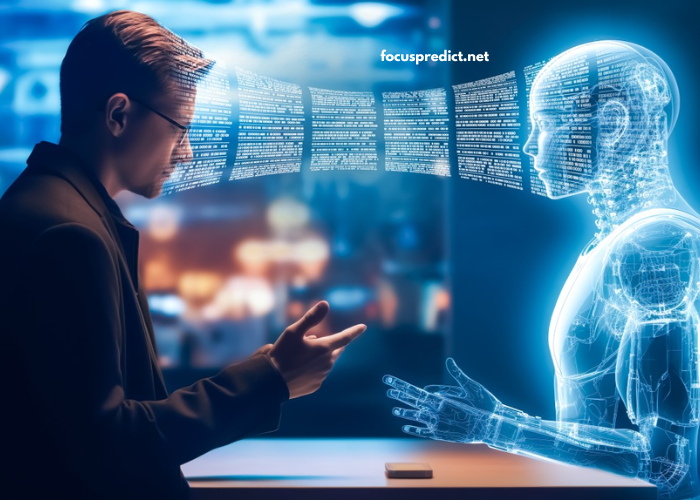The year 2025 marks a transformative era in technology, with Artificial Intelligence (AI) no longer a futuristic concept but a driving force behind global innovations. From smart assistants to predictive analytics, AI is reshaping industries, redefining human interaction with machines, and rewriting the rules of competition. This article delves deep into how AI is revolutionizing the tech landscape in 2025, impacting everything from software development to cybersecurity and ethical frameworks.
The Rise of AI in 2025: A Technological Renaissance
Unprecedented Investment and Adoption
AI in 2025 is witnessing exponential growth, with tech giants, startups, and governments investing heavily in AI-driven solutions. According to market analysts, global spending on AI technologies is projected to exceed $500 billion by the end of the year. The surge in investment reflects AI’s potential to enhance productivity, automate complex tasks, and deliver real-time insights.
AI Integration Across Sectors
From healthcare and finance to manufacturing and education, AI has permeated every major industry. Organizations are embracing AI to streamline operations, personalize services, and gain a competitive edge. AI-powered tools are now central to data analysis, customer service, risk management, and even strategic decision-making.
Revolutionizing Software Development
AI-Enhanced Coding Assistants
Software development in 2025 is no longer confined to manual coding. AI coding assistants like GitHub Copilot, Amazon CodeWhisperer, and Google’s Codey are enabling developers to write, debug, and optimize code faster. These tools use natural language prompts to generate code suggestions, significantly reducing development time and increasing accuracy.
Low-Code and No-Code Platforms
AI is democratizing software creation through advanced low-code and no-code platforms. These platforms empower users with little to no programming knowledge to build functional applications using AI-driven templates and logic builders. This trend is accelerating digital transformation and reducing dependence on specialized developers.
AI and Cloud Computing: A Powerful Combination
AI-as-a-Service (AIaaS)
Cloud providers such as AWS, Microsoft Azure, and Google Cloud have expanded their AIaaS offerings, allowing companies to access cutting-edge AI models without building them from scratch. These services include machine learning, natural language processing, and computer vision APIs that are easy to integrate and scale.
Smarter Infrastructure and Optimization
AI is optimizing cloud infrastructure management through intelligent workload distribution, energy consumption monitoring, and predictive maintenance. AI algorithms help in resource allocation, reducing downtime, and maximizing efficiency—paving the way for greener and more cost-effective cloud operations.
Personalized User Experiences
Hyper-Personalization in Marketing
In 2025, AI-driven personalization is at the core of marketing strategies. Machine learning algorithms analyze vast datasets to understand consumer behavior, preferences, and purchase history, enabling brands to deliver tailored content, product recommendations, and dynamic pricing.
AI-Powered Virtual Assistants
Virtual assistants have evolved into AI-powered companions capable of managing schedules, performing online transactions, providing mental health support, and even engaging in natural conversation. Tools like ChatGPT, Alexa, and Google Assistant now leverage contextual understanding and emotional intelligence to enhance user interactions.
AI in Cybersecurity
Proactive Threat Detection
AI is a game-changer in cybersecurity, enabling proactive threat detection and rapid incident response. AI-powered systems analyze network traffic in real time, identify anomalies, and alert security teams about potential threats before they cause damage.
Autonomous Security Systems
Autonomous AI systems can now respond to cyber threats without human intervention. These systems not only detect and neutralize attacks but also learn from them, continuously improving their defense mechanisms. This evolution is crucial in countering increasingly sophisticated cyberattacks in 2025.
AI’s Impact on Data Science and Analytics
Advanced Predictive Analytics
AI is enhancing data science by making predictive analytics more accurate and accessible. AI models can forecast market trends, customer churn, equipment failure, and more—empowering organizations to make informed, data-driven decisions.
Augmented Analytics Tools
Tools like Tableau, Power BI, and Google Looker now integrate AI capabilities to simplify data analysis. Users can generate insights using natural language queries, visualize trends automatically, and receive AI-generated summaries that make complex data easier to understand.
AI and Robotics: Smarter Machines
AI in Industrial Automation
In 2025, AI-powered robots are more agile, autonomous, and intelligent than ever before. These machines are used in logistics, manufacturing, agriculture, and even healthcare, handling tasks that range from warehouse sorting to surgery assistance.
Human-Robot Collaboration
Collaborative robots or “cobots” are working alongside humans, enhancing productivity and safety. With AI, these cobots understand human gestures, adapt to real-time changes, and learn from interactions, creating a more seamless integration of human and machine labor.
AI in the Creative Industries
Content Creation and Curation
AI is playing a pivotal role in content creation, from writing articles and composing music to generating artwork and editing videos. Platforms like ChatGPT, DALL·E, and Adobe Firefly use AI to assist creatives in developing unique and engaging content at scale.
Personalized Entertainment
Streaming platforms such as Netflix, Spotify, and YouTube utilize AI to personalize content recommendations based on user preferences, mood, and engagement history. This hyper-personalized approach increases user satisfaction and retention.
Ethical AI and Responsible Innovation
Addressing Bias and Fairness
As AI systems become more widespread, concerns around fairness and bias have gained prominence. Developers are now prioritizing transparent algorithms, bias audits, and inclusive data sets to ensure AI decisions are ethical and equitable.
Regulatory Frameworks and Governance
In 2025, governments and international bodies are enforcing strict AI regulations focusing on data privacy, transparency, and accountability. The EU’s AI Act and similar frameworks worldwide aim to ensure responsible innovation without stifling progress.
The Future of Jobs: Human-AI Synergy
Job Transformation, Not Elimination
Contrary to fears of mass unemployment, AI is transforming job roles rather than eliminating them. Routine tasks are being automated, allowing humans to focus on creative, strategic, and interpersonal activities. The demand for AI-related skills—such as prompt engineering, machine learning, and ethical AI—is skyrocketing.
Lifelong Learning and Upskilling
AI’s rapid evolution necessitates continuous learning. Educational institutions and corporate training programs are offering AI-centric curricula to prepare the workforce for future demands. Lifelong learning is now essential for staying relevant in the AI-driven economy.
AI in Healthcare: A Paradigm Shift
Improved Diagnostics and Treatment
AI is revolutionizing healthcare with enhanced diagnostic tools, predictive analytics, and personalized treatment plans. AI models can analyze medical images, detect early signs of diseases like cancer, and recommend optimal treatment options based on patient history.
Virtual Health Assistants
AI-powered health assistants and chatbots are providing round-the-clock support for patients, answering medical queries, reminding them of medications, and scheduling appointments. These tools enhance accessibility and reduce the burden on healthcare professionals.
Smart Cities and Urban Innovation
AI-Driven Urban Planning
Cities around the world are leveraging AI to optimize infrastructure planning, reduce congestion, and manage resources more efficiently. AI tools analyze traffic data, monitor pollution, and predict urban growth to support sustainable city development.
Intelligent Public Services
Public services such as waste management, emergency response, and law enforcement are becoming smarter with AI. Real-time data analytics and predictive models enable quicker responses, better resource allocation, and improved citizen experiences.
The Future of AI: Challenges and Opportunities
Navigating Ethical Dilemmas
As AI becomes more capable, it raises critical questions about surveillance, consent, intellectual property, and decision-making authority. Establishing ethical boundaries and building public trust are essential for AI’s sustainable development.
Unlocking Human Potential
AI’s greatest promise lies in augmenting human intelligence. By automating routine work, AI allows humans to focus on solving complex problems, exploring creativity, and enhancing emotional intelligence—unlocking a new era of human potential.
Conclusion: AI Is Redefining the Tech World in 2025
AI in 2025 is not just a technological evolution—it’s a cultural and economic revolution. It is redefining how we work, communicate, innovate, and even think. As AI continues to mature, it is essential to strike a balance between innovation and responsibility. The future belongs to those who embrace AI not as a replacement for human intelligence, but as a powerful tool to amplify it.
With its potential still largely untapped, AI is poised to lead the next wave of transformation across the globe—making 2025 a landmark year in the tech world.




